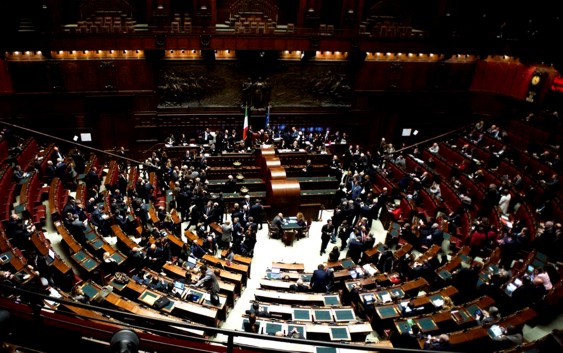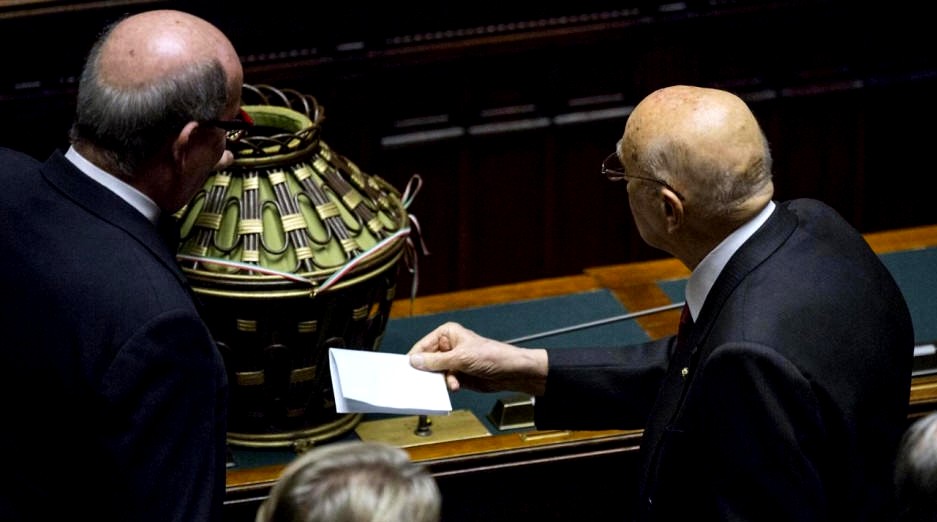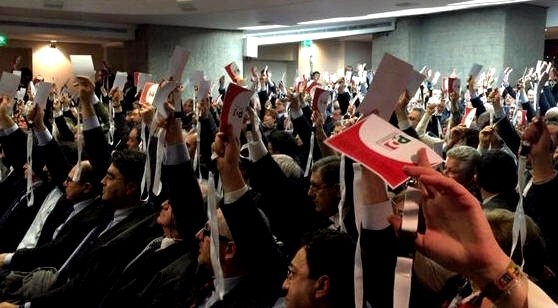
Political & economic headsup: US is demonstrating unsorted systems problems in spades. Do watch your investments. As Washington DC policy gets more & more off-target, big New York investors are betting very heavily that stocks will soon crash. Gross systems mismanagement 2017-20 tanked stocks several times.
Thursday, February 19, 2015
Interview Part 2 With Kelsey Kay About Her Sad Experience With Serial Exploiter Sollecito
Posted by Ergon
1. Overview Of These Two Posts
Part One of the interview with Kelsey Kay can be read here.
She is the young American woman Raffaele Sollecito attempted to marry in 2013 in an effort to gain American citizenship.
As reported in Radar Online and thereafter other newspapers around the world Sollecito first suggested to Amanda Knox that they should get married.
“‘Raffaele told me that when he had been in Seattle in March, his lawyers and Amanda’s lawyers had a meeting where he had proposed the idea of the two of them marrying,” she told RadarOnline.
“˜It would’ve been natural to the public that the two of them got married. Raffaele proposed the idea to Amanda and her lawyers so that he could obtain citizenship in the United States and stay’.
This was shot down by Amanda, which caused him to look elsewhere and how he selected Kelsey Kay. As already reported, he pushed a bit too hard and that made her question his motives.
Having already been in a destructive relationship she realized he was using her and broke off the “engagement” even though he already had announced it to his family.
This was when he approached other women, including Veronica Drake in Australia, and moved to the Dominican Republic to look it over and explore the chances of opening a business there.
He had already planned to move away from Italy, moving his assets first to Switzerland then to another offshore account. It appears he knew even before the 2013 Supreme Court hearing that the Hellmann decision would be annulled.
What is especially interesting is that he went to visit Meredith Kercher’s grave near London just prior to that ruling, against the express wishes of her family. Did his guilty conscience drive him there?
As we come to the end of this long and contentious process we all need to remind ourselves why we got involved in this fight for justice for Meredith Kercher. So many reasons, so many stories that swept us all up in it. This is just one of them.
2. Part Two Of The Interview
E: The Sollecitos are blaming his co-writer Andrew Gumbel and Knox’s American friends for the defamatory content in his book. Gumbel says he’s only the ghost writer putting together what he was told. What do you know about him and Gumbel, and was part of the content provided by the Moores, Bruce Fischer’s group, or Frank Sfarzo?
KK: “I don’t know any of the details regarding how his book was composed besides that he received a lot of help with it. Despite all the American exposure he has had since 2007 his English is still pretty broken at times. He asked me how to word things he was trying to express while he was here so there had to be a great deal of help with the book. That’s all I know on that. I’m sorry.”
E: He has hinted in recent interviews that Amanda Knox went out alone that night, in effect withdrawing her alibi. What did he say to you, and what do you think he means when he says “she (Knox) has things to explain”?
KK: “At the time I met Raffaele his relationship was just beginning to sour with Amanda. He was being strongly advised to cut ties with her but he hadn’t convinced himself this was the right move yet. He did NOT mention her leaving that night without him. He did however mention footprints to my friend Shelly and I over Skype. He said something along the lines of they’ve found new evidence with the footprints.
He gave the impression that it would be damning for both him and Amanda. He was very bothered on that day by whatever it was they found and this was before it was broken to the media. He didn’t elaborate. Just said that the prosecution was trying to twist the evidence with the footprints in a way that wasn’t accurate. He was fidgety and nervous during the Skype call.”
E: He wrote in Honor Bound that his lawyer Luca Maori had a meeting with prosecutor Giuliano Mignini to discuss a possible plea bargain, which is illegal under Italian law. What can you tell us about that? And did he make any other allegations about prosecutor Mignini?
KK: “He told me that many times he was offered to be let out or have his sentence lessened if he would throw Amanda under the bus. He actually seemed to think himself quite the hero for not doing so. Ironic how now that he is faced with the gravity of the current situation he has distanced himself. He always has two personalities. The personal puppy dog like Raffaele his PR wants you to see and the Raffaele that operates out of fear and selfishness with no regard for how his actions will affect others. I really don’t have much to offer in the way of Mignini that isn’t already known to the public. His family is convinced he is a mad man and a criminal himself.”
E: As you know, Raffaele Sollecito’s appeal will be heard March 25, 2015. Do you have anything to say to him?
KK: “I’ll save my breath for someone worth my while”.
E: You’ve indicated you moved on. What have you learned from this episode of your life, and is there anything else you would like to say?
KK: “What I’ve learned… I could really go into extensive detail here. I’ll try to cut it down.
1. I am a mother first, foremost, and primarily. No one and nothing comes in between that. I would never do anything so stupid again. I have more to consider than myself.
2. Looks can be deceiving. I thought Raffaele was a victim. It turns out he was really just a pretentious jerk and a mass manipulator. I’ve spent more time getting to know people on a more personal level since.
3. I have learned more about the empowerment of women. I really enjoyed getting to know Veronica, another one of Raffaele’s victims. We confided in one another quite a bit. I have never met someone quite as self-deprecating as her. She was so unaware of her beauty and how wonderful she truly is. I hope she’s past that. She’s an amazing woman. Raffaele doesn’t deserve to leave a mark on her confidence.
The only thing left to say is the most important thing of all. I want justice for Meredith Kercher. The true victim in all of this. She’s the one who really matters. The rest of us are just footnotes in a tragic story that needs to come to a close. I wish her family peace and the truth. That’s all.”
E: Thank you.
Tuesday, February 17, 2015
Interview Part 1 With Kelsey Kay About Her Sad Experience With Serial Exploiter Sollecito
Posted by Ergon
1. An Overview
We’ve been following for many years how the friends of Amanda Knox had been encouraging Frank Sforza and Raffaele Sollecito to obtain green cards by any means necessary.
That was in the mistaken belief it would somehow grant them immunity from criminal prosecution and extradition for their crimes. They certainly seemed to believe that, and it is especially ironic considering the recent news of Knox’s most recent “engagement”.
Just a year ago Radar Online broke the story of Kelsey Kaypernick, the young American woman who was pursued for a while by Raffaele Sollecito with offers of marriage.
When this came out she was attacked by the usual suspects, with harassment continuing until recently. Ironically, she was told NOT to speak to Ergon 😊
I spoke to her then and offered a voice. That I was more interested in the human side. She was intrigued except she had to wait for her contractual obligation to end, then was affected by concerns for her safety.
I held off on writing anything for that reason, but kept in touch with her for a year. Having spoken to her by phone and through e-mails, I found her very intelligent and believable. She contacted me recently, agreeing to do the interview. It is presented here, in its entirety.
2. Part One Of The Interview
E: How are you? Have you been able to put this behind you? Why have you agreed to speak with us now?
KK: “I’m doing great, thank you so much for asking. After doing much research and watching the chips fall where they may with Raffaele post my article with Radar I realized a lot. I was truly a small amount of collateral damage. I think it would be stupid of me to continue to be hurt by someone like him.
Especially when I’m equally responsible for allowing him into my life in the first place. I’ve agreed to speak to you now because I am no longer afraid. It took me some time to realize that all the threats being made towards me were unfounded. I’m a mother, so I had much more than myself to consider. However, by allowing those threats to control me, I was letting him win. I’m done with that now.”
E: Many of Raffaele and Amanda Knox’s supporters have questioned your motives, and posted personal information about your past. Do you have anything to say to them?
KK: “You know my name, not my story. Choose to fill in the blanks in whatever way is pleasing to you.”
E: Veronica Drake (in Australia) was told Raffaele Sollecito would be suing her. Have you ever been told legal action would be taken against you for speaking out?
KK: “Oh yes. Michelle Moore and Eve Applebaum made direct contact to threaten me. I also read threats made through his father and his lawyer. I had lots of contact with Noel Dalberth. She was mostly kind to me however.”
E: How did Michelle Moore and Eve Applebaum contact you and what threats did they make?
KK: “Eve emailed me directly, clearly she had gotten my personal email from Raffaele as I don’t hand it out. I give out my work email only. Michelle tweeted at me and I suspect called me from a blocked number.”
E: What is your impression of Raffaele’s relationship with Amanda Knox now?
KK: “What relationship? It seems non-existent to me.”
E: He did meet Amanda Knox in Seattle (in 2012). So, too, did his father and sister? Was it about their books only, for the publicity, or was their relationship soured already? Do you know why?
KK: “Sorry, I know nothing about that instance unfortunately.”
E: Have you ever met or spoken with a member of the Knox/Mellas family? Amanda Knox herself?”
KK: “I suspect I have had a conversation with Chris Mellas. I say suspect because my attacker hid behind a fake twitter. I was not allowed to speak with Amanda. Raffaele must have had his reasoning.”
E: What ID was used on Twitter by the person you suspect is Chris Mellas? What specific threat? Embarrassment, your past history, or?
KK: “@guilterwatchin or something along those lines. He threatened me in every way he could think of. Intimidation tactics, petulance, foul language and threats via twitter came my way for a few days after the article was published until someone advised me to block him. I have to say though, of all the people who have attacked me I found @guilterwatchin laughable. I mean really? A twitter attack.”
E: Were you surprised when you heard the news Raffaele Sollecito had been picked up by police close to the Austrian border?
KK: “Not at all. After all I found out firsthand that his intentions were to flee Italy. This goes right back to your inquiry about people questioning my motives. I’ve read some entertaining tales. In some of them I’m 17. In some of them I’m already married. In some of them I’m a money hungry whore. In some of them I was fat before my plastic surgery that I clearly got. I just laugh. You want to know my motives?
Well… ask yourself a few questions and infer what you want from the answers. Did any other women come out that the same thing had happened to them? Is it possible other women were spared the same fate? Did he get his passport taken away? Was he able to leave Italy? Well, there you go. I’ve said what I wanted. People can draw their own conclusions on my motives…. as is their right.”
E: Do you know why Raffaele Sollecito didn’t attend Amanda Knox’s big Vashon Island get together on July 26, 2013? Was he invited?
KK: “I have no knowledge of why. I do know that around that time their relationship had soured. He flew to Seattle when I called off the marriage and she refused to respond to his requests to see him. That’s what he told me anyways. I was extremely irritated when the first thing he did when I was having doubts was to flee to where Amanda lived but he assured me they were not on good terms and that she had refused to see him and was doing him an injustice. He described her as selfish. It’s actually comical to compare the relationship the media and their books paint that they have compared to what little I saw.”
E: Have you read the available court documents and pro-guilt arguments, and if yes, when and where?
KK: “I’ve read so many blogs on both sides I couldn’t begin to start telling you all the sources.”
E: After meeting Raffaele do you feel he could have written the book or was it mostly written by his co-writer?
KK: “There is no way Raffaele mostly wrote that book. He spends too much of his time contradicting it in reality. He was coached and took a back seat. In my opinion.”
E: After all you’ve learned about Raffaele, do you still believe him to be innocent?”
KK: “I’ve come to know Raffaele as a wolf disguised as a sheep. A liar. A fraud. A master manipulator with powerful resources. So do I still think he’s innocent? No. I wanted to believe he was. I no longer feel that way. I’ve been able to separate my emotions from common sense.”
E: After all you’ve learned about Amanda, do you still believe her to be innocent?
KK: “Again, No. But I didn’t get to know her like I did Raffaele. All I know is that it seems both of their stories are quite contradictory. There can only be one truth. If I was fighting for my life and I hadn’t committed the crime I was accused of I would remember everything like it had happened only a second ago. Neither of them seem to be on the same page. So therefore neither of them are believable to me.”
[Part two will follow in the next post]
See The Amazing Shrinking Raffaele Sollecito Live On National Italian TV
Posted by Peter Quennell

In this post of 7 February we quoted Italian sources on how Sollecito had yet again sold out Knox.
Now ericparoissien of PMF dot Org has added English subtitles for the full one hour. They show Sollecito progressively making things worse and worse for himself as well.
Clander has embedded six videos here (sign in) and (vital to read) a number of gotcha comments down below.
Months ago Knox was incriminating herself live on national TV as well. She has not appeared since. Maybe this is the last time we see Sollecito live as well.
Sunday, February 15, 2015
Journalist Andrea Vogt Highlights Non-Damning Nature Of Rome Embassy Cables About Knox
Posted by Peter Quennell

Ambassador to Italy David Thorne with Secretary of State John Kerry
1. US Freedom Of Official Information And Politics
Since 1967 the US Federal Government has had to provide certain official information to requesting citizens and organizations.
Most of those are watchdog groups and reporters. The relevant rules are quite elaborate, and can be read here and here.
About half of all information requested is handed over fully, about 3/8 is handed over with excisions and withholdings, and about 1/8 is not handed over at all, with summary reasons for the refusal. This can then be appealed or alternately brought to the attention of someone in Congress.
If a powerful congressman or committee staffer picks up the ball then the information can flow quite magically.
If the information can embarrass the presidential administration the other party can gleefully extract the information, if necessary with the issuing of a subpoena. The news media will usually pick this up and run with it, especially if a Congressional committee decides to ask questions or hold hearings.
We reckon that our readership and the case-watchers in general extend right across the political spectrum from left to right. No easy trick and we have always been quite pleased with this. It is usually impossible to tell what the political position of any poster or emailer is.
Same with the US media. Fox News cable news is generally thought to be right-wing and MSNBC left-wing and CNN tries to make it in the middle. But all three have had left-wingers and right-wingers on their shows supporting either Italy and justice or the anti-justice anti-Italy misinformation Knox campaign.
In other words support by Americans for Italian justice or for giving Knox a pass has had nothing to do with party lines. But that could change some.
Right now the presidential administration is on its back foot, as the other party controls both the houses of Congress. The Secretary of State and the Ambassador in Rome both work for the administration, and can be called to account by that Congress.
Knox happens to live in a city and state which largely goes along with the presidential party and administration. Senator Patty Murray and Senator Maria Cantwell are in the presidential party as is Mayor Ed Murray of Seattle.
Senator Cantwell is STILL the only influential politician who has taken a public stance anti-Italy; nobody from the opposite party ever has.
In 2009 Cantwell was sharply rebuffed and her facts corrected by the State Department and CNN’s legal analyst and even by some pro-justice Seattle voters..
In October 2013 Cantwell flashed in and out of a bizarre misinformation panel perhaps embarrassed to be associated with it.
Bottom line? The presidential administration and party does not seem in a strong position to refuse to hand over any documents, or without very strong reason to take a pro-Knox anti-Italy position.
We are not guaranteeing that this case will become a political football. But it could. If it does, the Knox gang will have only weak political allies (if any) and what the Rome Embassy reported to the State Department 2007-2015 is really going to matter.
How does all this relate to what Andrea Vogt has recently encountered?
2. Andrea Vogt And The Cables From The Rome Embassy
Andrea Vogt in effect holds a giant lever. She has long pursued her right as an American journalist to surface what the consular officers in the Rome Embassy who watchdogged the 2009 trial and 2011 and 2013 appeals and Knox’s stint in prison had been reporting back to the State Department in Washington.
Releases of copies of cables in 2010 showed “no cause for concern” over Knox’s treatment and copies of cables in 2011 showed likewise.
There was zero official paper trail helpful to a Knox fight against extradition. That was despite a very nasty effort by Knox forces to lean on the Embassy and the State Department by complaining directly to President Obama.
Now Andrea Vogt is reporting on the Freelance Desk in “Update Feb 13 2015” on her experience with a new batch of cables.
Oddities to our eyes are that (1) in this batch, some requested cables were not released; and (2) a cable in October 2011 at the end of the Hellmann appeal wrongly declared “case closed”.
Passages of special interest have been highlighted here by us.
Many may view the cables as just routine bureaucracy, which in large part they are, but I believe they are important documents to add to the public record for two reasons.
First, they show insight into how American citizens in trouble abroad are supported (or not, depending on your viewpoint) by their government.
Second, they contribute transparently to the established written government record, clarifying diplomatic aspects of the case that until now have remained hidden while the saga played out solely in Italian courtrooms and the media.
The results of this second batch of FOIA requests were of particular importance due to the grave accusations being launched against the Italian police and members of its judiciary by members of Knox’s family, supporters and public relations team during the period of her incarceration.
The question at hand: was Amanda Knox abused, mistreated or robbed of a fair trail in Italy? How closely was the state department monitoring the case and what did embassy officials do, or not do, as it evolved?
The answer, first revealed in this first batch of embassy cables released to me in 2012 and dating back from 2007-2009, is that embassy and state department personnel actively monitored the case and provided aid from the very first days after her arrest. Other state and federal documents that I published back in 2010 ... show how Washington State’s congressional delegation, namely Sen. Maria Cantwell, was also involved.
This second batch of FOIA-requested embassy cables was released to me in late 2014 in response to another more extensive FOIA request made in 2012 (a two-year lag time is not unusual for broad requests)...
In brief, these new cables shows that the trend of close state department monitoring of the case was constant, with consular involvement up until the day (Oct 11, 2011) that the U.S. Ambassador Thorne in Rome sent a cable to the secretary of state in Washington D.C., officially declaring the matter “case closed.”
The communications are noteworthy because they bust a number of media myths about Amanda Knox’s release and immediate departure from Italy after her release in 2011, namely that the U.S. embassy did not receive her in the hours immediately post release for consular services, as she was traveling on a valid U.S. passport.
The other interesting point is that though the case was far from over in Italy, once Amanda Knox was off Italian soil, it no longer considered the case to be of interest. “With the verdict of Oct. 3 overturning Amanda Knox’s prior conviction, her immediate release from prison and her subsequent departure from Italy today, Post considers this case closed. THORNE.”
For American citizens abroad, it is a welcome reminder that the embassy works on citizens’ behalf, as are the four documents released with excisions that show Knox was regularly visited by consular officials every six weeks and brought reading materials.
It is worth noting that the only persons to publicly report to have regularly visited Knox in prison to bring her reading materials were those associated with the Fondazione Italia USA, namely Italian parliamentarian Rocco Girlanda and Corrado Maria Daclon, the two men also present with her in the car that drove Knox out of prison the night she was acquitted.
Coincidence or are these the consular visits the cables refer to?
As soon as Knox was out of the country, the embassy declared “case closed,” perhaps not expecting that her trials would continue. Those who have followed the case know that the acquittal that prompted her release was later annulled in its entirety by Italy’s Supreme Court, which called for a second appeal trial to be held in a separate venue: Florence….
For the British and Italian authorities, and family members of Meredith Kercher who have patiently waited out the Italian legal system, perhaps the “case closed” cable jumped the gun. Once an American citizen is out of the country where he or she is in trouble, what duty does the embassy have to keep following legal developments that involve an American not physically in the country?
Did the embassy re-open the case later once the Supreme Court quashed the acquittal or is it “out of sight, out of mind,” and once an American in trouble abroad is no longer abroad, the embassy in that country can effectively wash its hands of the matter? Is it still considered “Case Closed”?
As the possibility of an extradition process hangs in the balance with the upcoming March 25 supreme court decision, the documents may provide some additional material for legal scholars to consider.
As the State Department letter points out, there are still 11 documents that fall under the umbrella of my initial FOIA request that have not been released that require further coordination.
Based on the content of my 2012 request, I believe these may be documents relating to then Sen. John Kerry and the U.S. Committee on Foreign Relations, of which he was chairman from 2009-2013 [ed note: and Senator Cantwell was a committee member] and to which specific FOIA requests were made, and for which I have not yet received response.
I have scanned and uploaded the 2-page FOIA response and 5 released cables (Oct 2011, June 2011, March 2011, November 2010, September 2010) below…
Andrea Vogt included images of those six seemingly mundane documents she received below the report, praises the Embassy and State, and voices no suspicions.
Amazingly, not one other American reporter has pursued this obvious angle. Still, in a political fuss, all those many others described in Part 1 above could also choose to do so.
Sollecito v Italy & Guede: My Subtitled YouTubes Of Rudy Guede’s Interview with Leosini
Posted by Eric Paroissien
Friday, February 13, 2015
The Sollecito Trial For “Honor Bound” #7: Why It Also Threatens Amanda Knox
Posted by Peter Quennell

Cover of the New York Post (owned by a probably gleeful Rupert Murdoch) this week
We will soon be posting several hundred easy-to-disprove lies we have identified by Knox.
Late March Cassation will probably rule that Knox needs to go back and serve her time, and if so between then and late-year there will probably be an attempt at a big media fuss.
But lying to the US media and public in the next few months is going to be a more-than-normally dangerous game.
Brian Williams is the news anchor for the NBC network’s nightly news, who was often a guest on late-night comedy TV, where he made himself look super-sized.
William was just outed by soldiers who had complained that he lied when he said a helicopter he was in in Iraq took shots and was forced down. That was another helicopter in a companion group out of sight.
He’s now suspended, without pay, and his contract does not let him talk. Death by 1000 cuts and (like Sollecito and Gumbel) without making things worse he cannot talk back.
Williams was long suspected of lying about his experiences when Hurricane Katrina hit new Orleans in 2005.
Williams had made several questionable claims in interviews and a documentary: He witnessed a suicide at the Superdome in New Orleans, saw a body floating by his hotel in the French Quarter and had contracted dysentery from accidentally ingesting floodwater.
Throughout Thursday, Williams was pounded by bloggers and newspaper columnists, who noted that he hadn’t reported the suicide when he was on assignment in New Orleans, that the French Quarter had largely remained dry during the hurricane and that there were no reported outbreaks of dysentery.
Today the reports get worse: it seems Williams also lied about being on a flight with some Navy SEALS as well. And there is said to be worse to come.
And who is entangled in this bad news? Bob Barnett, Williams’ lawyer, who brokered Williams’ $10 million a year contract a few weeks ago. He also brokered Amanda Knox’s book full of lies to the US.
Bob Barnett will not want to see Knox and her dishonest team draw attention to this by telling the US media and public yet more easy-to-disprove lies. Defending one big-time liar will be more than enough.
By the way, the big expose of Gumbel’s lies is still ahead. Those by Preston, Heavey, Fischer, Moore, etc, too. Knox should maybe dump them all, and give up her foolish fight.
When one is in a deep hole, the best advice is to stop digging, right now.
Wednesday, February 11, 2015
The Sollecito Trial For “Honor Bound” #6: Examining Gumbel’s Role In Biasing The Book
Posted by Our Main Posters
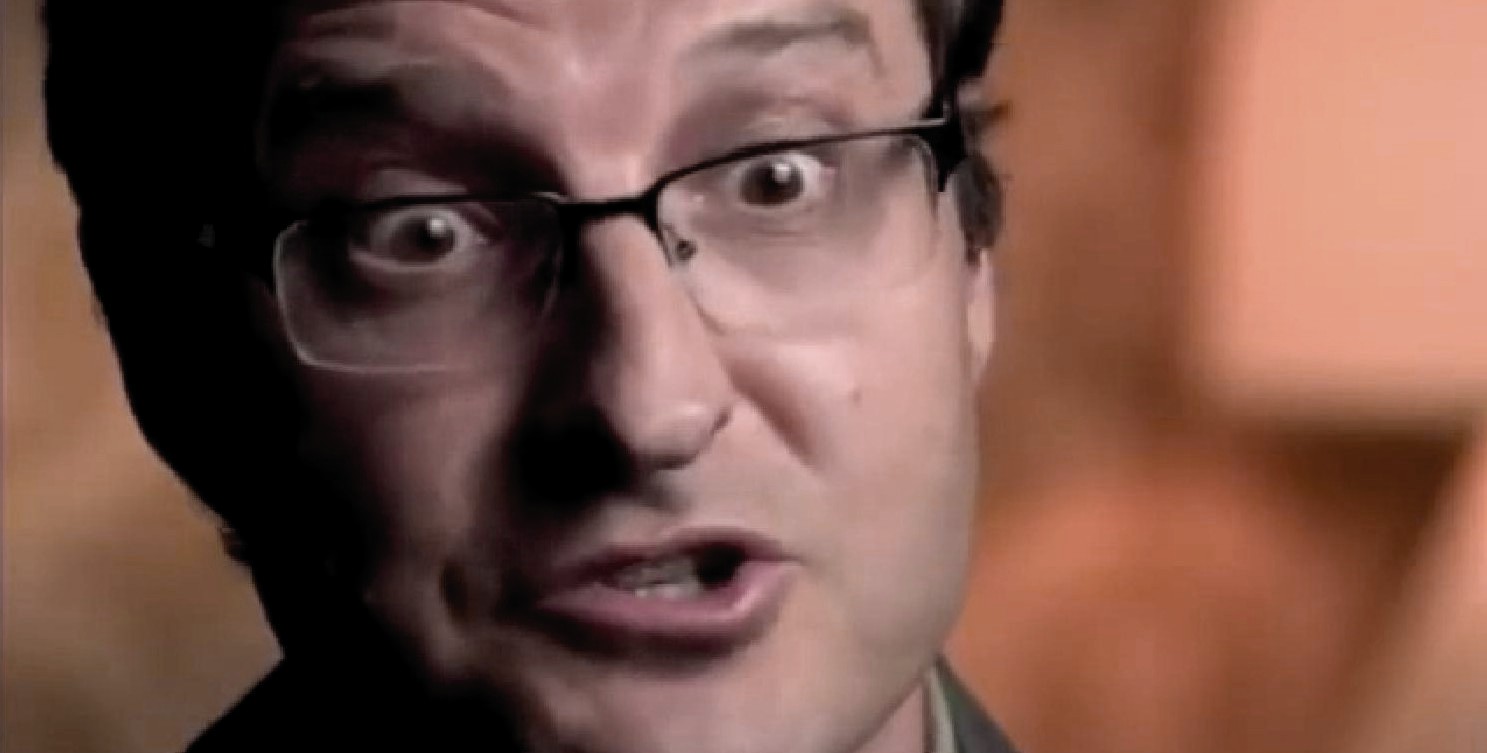
Andrew Gumbel seen in a shrill 2014 CNN report, perhaps the least balanced so far
1. Bringing The News Up To Date
On 5 March the Florence court will replace the prosecution’s translation of the target claims in the book with its own translation.
And Sollecito and Gumbel will probably be ordered to stand public trial then.
Both the prosecution and the guiding magistrate have as usual in Italy played immensely fair in this case. Each gave Sollecito and Gumbel numerous opportunities over more than a year to try to explain and justify certain target passages in a way that gets them off the hook. In further fairness the hearings have all been closed.
What leaked out after the last hearing in Florence a couple of weeks ago suggested that Sollecito has yet to come up with any justification at all. He was said to look dazed and depressed.
Gumbel was not in court. But his lawyer apparently claimed that Gumbel was merely a sort of well-meaning sheep: Sollecito’s ghost writer, nothing more, who faithfully took down only what he heard from his client.
This has apparently not gone down at all well in the Sollecito camp.
The Sollecito family and legal team has long hinted rather publicly that Gumbel did a number on them, an end-run. Francesco Sollecito and the family and Sollecito’s lawyers Giula Bongiorno and Luca Maori had all claimed within several weeks of the book coming out that numerous passages in the book were malicious and untrue. Sollecito himself denied that he put them in.
The Sollecito family and legal team have also hinted ever since that Gumbel and some American Knox cronies with self-serving agendas (suggested on pro-Knox websites to have been Steve and Michele Moore, Frank Sforza, Bruce Fischer, maybe some more) had recklessly put dangerous unfounded claims in the final draft of the book.
Those claims (now the main subjects of the Florence trial) were seemingly never put into Italian and run carefully by them. No proper due diligence was done, and as a result they have been left holding the can. And all this under the cold eyes of the Supreme Court, which must rule in six weeks whether Sollecito makes things up.
2. Smart Rules For Ghost Writers To Avoid Trouble
This is hardly the first time a ghost writer and their client have fallen out. It is a touchy trouble-prone profession not governed by formalised training or an established code of ethics, where getting sued or not getting paid is quite a frequent thing.
Some of those who do it full-time and have had their share of trouble and want no more of it and want to alert others have posted their own suggested groundrules online.
For example, both client and ghost writer are well served by spending a few days checking out each other. Then they make a contract where literally everything needs to be spelled out.
Ghost writers need to take extreme care with clients in legal trouble who might drag them in or who they might drag in further. They need to be clear whether they are to research on their own, and to whom they are permitted to talk.
They need to know whether their name will be on the cover or anywhere inside the book. They need to know whether they have a licence from the client to do related TV and print articles, especially if those pay a separate fee, and what they are allowed to say.
They need to try to capture honestly the client’s voice and not turn them into someone they are not. They need to know what facts to put in and to be clear what facts are consciously left out. They need to do due diligence on the drafts with the agent and publisher and lawyers, and if allowed check out dynamite claims with “the other side”.
And if any accusations of crimes are to be made they REALLY need to check those legal hot potatoes with the client and the lawyers and the publishers, line by line.
Gumbel seems to have ignored pretty well all of these groundrules, and dug Sollecito in much deeper.
Knox’s ghost writer Linda Kulman (more experienced than Gumbel at this and with no axe to grind) seems to have followed some but not all of these guidelines. Her name is only in the Knox book once, in a short thankyou note by Knox at the back, and she remained low-key and made no separate statements.
Nevertheless, Linda Kulman had the Sollecito book as a (then) largely unchallenged model. She included in the book a number of false accusation of crimes and malicious ridicules of others, none of them properly checked out, which will have Knox in court for sure before too long. (Oggi is already in court for repeating some of her claims.)
Linda Kulman also included an entire chapter about Knox’s “interrogation” where every detail is made up. She included a lengthy claim that Mignini did an illegal interrogation of Knox, when in fact he wasn’t even there. And she left out numerous key facts, such as that Knox was having sex with a major drug dealer almost to the day of her arrest, and most of the evidence.
Linda Kulman certainly dd not capture Knox’s real voice or mode of behavior, which are notoriously brash and possibly the root cause of Meredith’s murder.
3. Flashing Warning Lights In Italy In 2012
If the Sollecito family and team did not know all of the above, it would seem to be Sharlene Martin’s fiduciary duty as book agent for Sollecito to make sure both they and any ghost writer they hired did know.
For their part, the Sollecito team should have done their own due diligence in Italy, and perhaps looked around for an experienced ghost writer in Italy who could converse with all of them and show them in Italian what would be in the book. And in particular known about and been respectful of this which was in our first post.
On 3 October 2011 Judge Hellmann told RS and AK they were free to go, despite the fact that no legal process for murder and some other crimes is considered final in Italy until no party pursues any further appeals or the Supreme Court signs off. Most still accused of serious crimes (as in the UK and US) remain locked up. Hellmann, pathetically trying to justify this fiasco ever since, was firmly edged out and still the target of a possible charge.
Other flashing warnings should have made Sollecito’s family and legal team and book writers very wary. They included the immediate strong warning of a tough prosecution appeal to the Supreme Court. They also included the pending calunnia trials of Knox and her parents, the pending trial of the Sollecitos for attempting to use politics to subvert justice, the pending trials of Spezi, Aviello, and Sforza, and so on.
A major flashing warning was right there in Italian law. Trials are meant to be conducted in the courtroom and attempts to poison public opinion are illegal. They can be illegal in the US and UK too but, for historical reasons to do with the mafias and crooked politicians, Italian laws in this area are among the world’s toughest. So mid-process, normally no books are ever published
4. Warning Lights About A Hasty Gumbel Contract
Many of the problems in the book are associated with a strident anti-Italy tone. Well over half the false claims taken apart in this May 2014 post are FACTUALLY wrong in areas where Sollecito has no known knowledge or point of view.
For example, it was claimed that the Italian justice institutions are both very unpopular and corrupt. Neither is true, and almost no Italians believe that.
Sharlene Martin was first mentioned as Sollecito’s agent in the NY Times on 5 December 2011 when Sollecito had been swanning around the US west coast in an apparent attempt to, well, get her back in the sack. He was in a weak mode.
On 10 January 2012 Francesco Sollecito was reported in the Journal of Umbria as saying this about the purpose of the book
“I have not done the math [the lawyers etc costs]. For good luck. I will do it after the ruling of the Supreme Court. It will be painful because the figure of one million euro of which one speaks is not far from reality.” This was stated to the weekly Today, on newsstands tomorrow, by Francesco Sollecito, father of Raffaele.
According to [Francesco] Sollecito, in case of confirmation of absolution, then there will be 250-300,000 euro compensation provided for the unjust detention of his son, this money will be enough only to pay the fees of the 12 consultants “that we had to appoint to succeed to refute the allegations.”
In the interview with the weekly, Francesco Sollecito denies that Raffaele has a girlfriend, as reported after the publishing of photos while kissing a girl: “Annie, the girl who appears with him in photos on Facebook is just a friend, in fact a sorta of cousin… “The priorities of my son right now are otherise.” What? “Raffaele has signed a contract with the American literary manager Sharlene Martin for a book, it is a definite undertaking “.
Apparently at this point Sharlene Martin had not been to Italy or spoken face-to-face with Francesco or the legal team. Whether she had briefed herself on the warning lights described above so that she could properly warn the US team of writer, editors, publishers and publicists is not known.
5. Gumbel’s Shrill Record Of Sliming Italy
On 12 February 2012 Andrew Gumbel is reported in the NY Times as having got the co-writer job. During that period due diligence (if any) on his background would have been done, seemingly mainly by Sharlene Martin (if any) as a complaint of Sollecito’s team is that they could not look him over before he came on board.
Andrew Gumbel is not a lawyer, and in fact our own lawyers have repeatedly found silly his pretentious and inaccurate legal claims. Nor as far as we know does he have a track record as a ghost writer. His main claim to the job seems to have been based on his having been based in Italy with the UK Independent for nearly five years in the 1990s.
The 1990s were a pretty good time in Italy.
There was okay growth and jobs availability, record tourism, relative political calm before Berlusconi grabbed political and media power, many successful farms and firms, and a really push against the mafias - for which many brave judges and prosecutors had died. The Italian food and wine were great, the cars and luxury goods were great, and Italy was home to about half of the finest medieval art in the world.
We checked it out: foreign reporters in Italy at the time did a fair and balanced job reflecting all of this. With seemingly only one notorious exception: the British reporter Andrew Gumbel for the UK Independent.
Apparently Gumbel could find almost nothing to like about Italy. In 5 years almost nothing to write a positive report on.
Brits relying only on his shrill reporting in the Independent may have thought Italy to be a very corrupt, lawless, politically and economically dysfunctional place, with nothing about it to like and no reason to visit. If they were bigoted, this could have made them more-so. Nasty stuff, and for foreign reporters in any country anywhere very unusual.
Below are the headers for most or all of Andrew Gumbel’s shrill reports from Italy.
Fair and balanced? The right guy for a delicate project with his client in a delicate legal bind? You decide. We have highlighted in yellow all the reports with a negative bias, maybe true, maybe not. Of the total of 62 reports only 4 seem to us neutral or nice. Were the Sollecitos or their Italian lawyers or HarperCollins made aware by Gumbel or Sharlene Martin of Gumbel’s emotional negative bias?
- A sick economy shakes out the fake invalids. (growing economic problems in Italy make corruption less acceptable)
- Bickering while Venice sinks.
- Can Italy survive Dini’s fall? (prime minister Lamberto Dini)
- Chirac consigns Italy to Europe’s second division. (French president Jacques Chirac)
- Corruption on an Olympian scale.(Rome, Italy, seeks to host Olympic Games)
- Facing up to Italy’s crisis. (Italy’s economic problems)
- Glitz takes a back seat on road to Rome. (Romano Prodi begins electoral campaign in Italy) (Interview)
- How the kidnap and rape of Dario Fo’s wife was ordered by Italy’s right-wing rulers.
- Illegal migrants reach EU havens via Italy.
- Italy waits for the gravy train to be derailed. (problems facing Italian railway system)
- Italy ready for mission impossible: intervention in Albania could bring instability to Rome.
- Italy heads back into a political void.
- Italy struggles to shake off the legacy of Mussolini.
- Italy’s Olive Tree fails to bear fruit.
- Italy’s rich city prays for fall of nation state. (citizens of Bologna, Italy, strongly in favour of European Union)
- New wave of state corruption stuns the Italians.
- Past demons threaten Italy’s bid for change. (Italy fails to move towards a SEcond Republic)
- Prodi’s dilemma: let the left win or surrender Italy’s drive towards Emu. (Italian Prime Minister Romano Prodi)
- Rome’s magic circle. (deterioration of the Colosseum in Rome, Italy)
- Scholars in a spin over Churchill link to the death of Mussolini. (claims that Mussolini was shot by British secret services)
- Shouting could drown out Italian democracy. (serious political clashes damage reputation of Italian parliament)
- So, were there offers he should have refused? (trial of Giulio Andreotti)
- The Nazi and the protection racket. (controversy over trial of former Nazi Erich Priebke in Italy)
- Venice’s grand opera descends to farce. (dispute hampers rebuilding of La Fenice opera house)
- Why Italy cannot bring war criminals to justice.
- Il Papa brings on Dylan for a taste of the devil’s rhythms. (Bob Dylan to perform for Pope)
- Inside the Assisi basilica, a sight to make saints weep. (challenges involved in restoration of art treasures from Basilica of St Francis in Assisi, Italy)
- A nation that brings its style to the track. (many changes to Italian rail network)
- All is not bene among the united colours. (problems facing Benetton)
- Berlusconi consolidates his rule over the Italian air waves. (former prime minister Silvio Berlusconi)
- Ciao Gianni, but now what? (Gianni Agnelli resigns as chairman of Fiat)
- Climax of Italy’s TV war. (referendum on whether Silvio Berlusconi should sell his television channels)
- Italy’s new crop stifled in the shadow of a paradise lost.(problems affecting the Italian motion picture industry)
- Murdoch pursues Italian television. (News Corp seeks stake in Silvio Berlusconi’s media empire).
- The dark world behind Versace’s life of glamour. (murder of fashion designer Gianni Versace)
- Accidental death of an anarchist comes back to scandalise Italy. (three men convicted of murder of police commissioner Luigi Calabresi in 1972)
- A fashion label that really is to die for .... (murder of fashion designer Maurizio Gucci may have been instigated by his former wife)(Column)
- After the suicide, a wall of silence. (new type of Mafia activity in Sicily)
- Amnesty offers Italy chance to forget its years of terror. (Italian government pardons six people involved in Red Brigades terrorist group in 1970s)
- Andreotti to face trial on Mob links. (former Italian prime minister Giulio Andreotti to stand trial for consorting with the Mafia)
- Another black mark against Italy’s judges. (Italy’s anti-corruption magistrates lose their credibility)
- Arrest us, but we’ll be back next week. (three Italians with Aids use legal loophole to rob banks)
- Backlash threatens to silence informers. (controversy in Italy over Mafia informers)
- Bloody end of a fashionable affair. (murder of Maurizio Gucci)
- Fake invalids at heart of Italy’s postal scandal. (postal service employs many invalids, but some are fakes)
- Fear and loathing in the Alto Adige. (serial killer murders six people in Merano, Italy)
- Godfather’ village baffled by murders. (Sicilian town of Corleone)
- God’s Banker: ‘He was given Mafia money and he made poor use of it.’ (investigation into death of Italian banker Roberto Calvi in 1982 may soon be concluded)
- Gucci: hell for leather. (Patrizia Gucci convicted for contract killing of former husband Maurizio Gucci)
- How Cosa Nostra’s cunning outfoxed the Italian state. (Mafia’s criminal network still operating in Italy)
- How Italy failed to trap its Monster. (failure to bring serial killer in Florence, Italy, to justice)
- Italy’s men of violence throw off the state’s chains. (revival of the Mafia in Italy)(includes details of murder of magistrate Giovanni Falcone)
- Mafia trawls Venice’s dark lagoon. (organised crime in Venice, Italy)
- Mysteries unravel as mafiosi spill secrets. (Italian gangsters make confessions)
- One woman’s dangerous and lonely battle to break the Cosa Nostra. (challenges facing Maria Maniscalco, mayor of San Giuseppe Jato, Italy)
- Rome turns a blind eye to Mafia’s killing spree.
- Secret of why the Mafia has never shot a soul. (code of silence about Mafia in Sicily)
- Street wars in Italy’s wild south. (high crime levels in Naples, Italy)
- Who killed Pasolini? (new film about the murder of Pier Paolo Pasolini)
- After the deluge (eruption of Mount Vesuvius in Italy will create chaos)
- Assisi in mourning as quake shatters Basilica of St Francis.
- Umbria shows the civilised way to cope with calamity. (effects of series of earthquakes in Italy)
1. Gumbel Articles On Italy’s Government + History (25)
2. Gumbel Articles On Italy’s Scenery, Art, Music, Fashion, Culture (2)
3. Gumbel Articles On Italy’s Economy + Business (8)
4. Gumbel Articles On Italy’s Justice, Crime, Corruption, Mafias (24)
5. Gumbel Articles On Italy’s Physical Disasters (3)
6. Conclusion And Next Posts
This list was checked out with half a dozen posters resident in Italy at the time. All of their reactions were to the effect that, in lying by omission, Gumbel did not play fair with Italy back then. A trivial mind. One which should have been fought off with a stick.
The next posts seek to identify what Gumbel and the Knox misrepresenters (said to be primarily the Moores, Sforza and Fischer) were responsible for putting in the Sollecito book, and to describe Andrew Gumbel’s vigorous public media campaign. Whether authorized or not authorized, he made around 20 shrill damaging interventions.
Saturday, February 07, 2015
Sollecito On Italian TV: Seems RS And AK Selling Out One Another Is Gravitating To A Whole New Plane
Posted by Our Main Posters
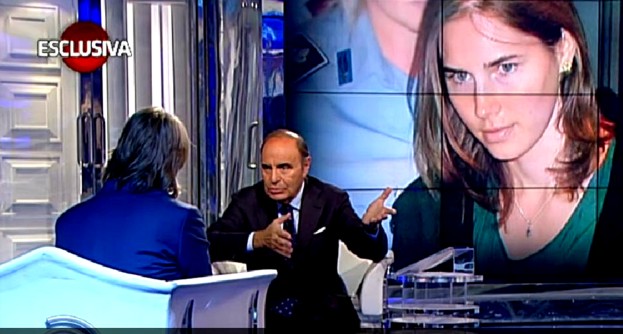
Nearly 30 instances of Knox and Sollecito selling out one another since 2007 were described here.
In addition to those, their two books also took some subtle whacks, and also there have been some other media instances since. Sollecito took several more whacks at Knox on the national crime show Porta a Porta last night.
That and his bland evasive, nervous manner seems to have done himself harm too. Italy has watched this tired show too often now, and it was Porta a Porta back in 2012 which first surfaced false accusations of crimes in his book for which he is now on trial in a Florence court.
Amazingly, Sollecito admits to stalking and harassing Meredith’s family, which under Italian law (and UK law and US law) for the protection of victims and their families is itself a felony crime. There should be no attempts at communication with them at all. Knox too has been harassing and stalking the family, and dangerously encouraging the more unstable of her followers to follow suit.
Our main poster Jools kindly translated this from the newspaper for Sollecito’s home town. Note the passages in bold.
Raffaele’s Truth
Sollecito guest of “Porta a Porta” told his side of the story about the murder of Meredith Kercher
“Yes, I have thought I could be going to prison, for me this is astonishing. I done nothing, I have nothing to do with it and there is nothing that places me on the crime scene in a factual manner.” Words pronounced by Raffaele Sollecito during the Rai 1 program “Porta a Porta”, hosted by Bruno Vespa. The computer engineer from Giovinazzo is accused of the murder of British student Meredith Kercher, which occurred in Perugia the night between 1 and 2 November 2007.
In seven years there have been four trials. Convicted in first instance trial with Amanda Knox, Sollecito was acquitted on appeal court. But that appeal court decision has been annulled at the Court of Cassation, leading to a new conviction sentence of 25-years. In March, exactly on the 25th, Raffaele Sollecito will face the final instance of the process. In prison for the time being there is only the Ivory Coast national Rudy Guede, who is serving a definitive 16-year sentence. “My life did not changed on the night of the 1st and 2nd November ““ said Sollecito pressed by Bruno Vespa - but when the investigators took me to jail. Knowing, meeting, making the acquaintance of Amanda fatally brought me into this hell.”
Raffaele’s life is suspended pending the final verdict, while Amanda Knox lives in the United States where she works writing theater reviews for a local newspaper in Seattle and is considered a victim of the Italian judicial system. “I can not answer for Amanda,” Sollecito reminded Vespa and then retraced the events of that night: “From around the hours of 20:30/21:00 I was home - said the accused - and I did not go out to Via della Pergola with Amanda when she went back. I stayed behind sleeping. At that time of my life I was smoking a joint every now and then, especially if I was in company - he admitted - and that night I smoked a very small amount present in my drawer. In fact, the investigators did not find anything because it was a little amount totally smoked.”
This would justify the sketchy memories in relation to those hours. Raffaele Sollecito does not remember when Amanda came back to the apartment but he is certain, “Amanda did not sleep at my place” [Ed note: mistake here, he said Knox did sleep at his place.] About the strange way the American woman behaved in the hours immediately after the murder, Sollecito reiterated that, “Amanda explained during the court hearings of being frightened during the interrogation.”
Just like the American student at the time, Sollecito wanted to stress of having suffered “relentless pressure from the investigators. They told me I would never be released from prison. They kept me 15 hours under interrogation. I fell into contradiction for not understanding what day they referred. They took off my shoes, leaving me barefoot, thinking that those shoes were the ones I was wearing during the murder. Then they admitted my consultant was right after eight months ““ he stressed - about the shoeprint found in Meredith’s room, while we had already provided that proof after 2 months. It was my consultant to find the inconsistencies of the prosecution.”
The morning the body of the poor British girl was found, Sollecito recounts, “Amanda told me that she saw the shattered window [panes] and the door to her house wide open and that she thought her roommates had gone to take out the garbage. There were a few drops of blood when I arrived. Meredith’s door was key locked and I told Amanda to call her roommates and Meredith.” In any case, following a question by Vespa he specified, “I don’t think Amanda killed her. It doesn’t seem possible. I would have noticed something. This argument seems to me unlikely. But she must respond herself to these allegations, not me.”
Things did not go well and then came the judicial ordeal that still continues and that rather involves him personally. Raffaele is certainly different, now an IT graduate who struggles to find work, but who still wants to shout to the world his innocence after 7 years. He watched the images of his fellow citizens and friends defending him during a broadcast report and recounts of having tried to contact the victim’s family, “I have tried several times to talk to Meredith’s parents - he said -. If the facts are looked at in an impersonal way one understands that a lot of mistakes were made. I sent a letter to Dr. Maresca their legal representative, with not getting any replies. Even my family has tried to contact them, without them ever coming to approach.”
The question mark with which Sollecito will be arriving on March 25, the date of the trial before the Supreme Court, remains the same for a long time: “What motive did I have to hurt Meredith? This is about having justice on what is the truth.” One truth and a justice that now are in the hands of the Roman judges.
In fact as most Italians know Sollecito was interrogated quite briefly that night and the only pressure was from his own phone records, showing he had lied. Knox was not formally interrogated at all. Her ONLY pressure came directly from him.
Our main poster Yummi suggests that what was going on here could be this:
The purpose of his show seems to me to be to point out the “difference of positions” between Sollecito and Knox. I think it is obvious that this is the main “message” of the Porta a Porta show; and I talk not just about the content of his interview, but also the whole setting, the framework including the journalist’s report on the show about the Florence trials in which the “main points” of his defence were described..
Sollecito does not make explicit statements to put more distance between him and Amanda, not more than he already had. But the theme of “difference of positions” is highlighted, and he even draws attention to some known inconsistencies such as the open/closed Filomena’s door.
Indeed he himself makes a declaration contradicting his own statements to the police and to Judge Matteini, and in his own diaries (in the show he says “socchiusa”, but he wrote “spalancata” in his prison diary and this is what he stated to the investigators too); but what he tries to do in the show is to point out himself the inconsistency as something that is responsibility of Amanda, one of the things “she should explain”.
The report - to which his attorneys may well have contributed - points out that the “main defence points” at the Florence trial were:
1) that “Raffaele is not Amanda” (he happens to be implicated because of evidence against Amanda), and
2) that Amanda herself does not place Raffaele Sollecito on the scene of crime in her statements; it is remarkable that Sollecito highlights the content of Knox’s statements from Nov. 5-7 rather than her subsequent claims; and the same defence arguments even imply that Knox does not place herself in the company of Sollecito at all..
Another point that I found remarkable, was when Sollecito points out how it was “a judges’ finding” that he was a “collateral effect” [sic]; I mean it is glaring that he quotes the courts as a source that adds credibility to his theory.
So by the end I thought the setting of this show included “help” given to the journalist Vanni by Sollecito’s attorneys, and I think the purpose is obvious, if we want to see it as a kind of message-in-a-bottle to the Supreme Court on approaching the March 25th hearing.
It is basically a point of law, that is that the evidence against Amanda Knox should not be transferred onto him. This is the aspect he really wants the Supreme Court to review. Amanda Knox has “things to explain” and he should not be demanded to answer for them.
As Knox might now want to point out, there is of course very extensive evidence tying Sollecito to the crime. Consider this and in particular this.
Tuesday, February 03, 2015
To Create Points With More Traction For His Yawnfests, Mr Heavey Convenes A Mock Court…
Posted by Grahame Rhodes

“Right” said Mr Heavey “I have convened this mock court to replace some of our failing arguments against the mountain of pesky evidence implicating our little cherub, Amanda Knox”
“Amanda of course is innocent. We all know that. Guede was the sole attacker, and Amanda and Sollecito were not there, and all of Italy has got it wrong.
“Let’s begin with some of the pesky items we have not yet shaken, and see if we can explain them away.”
(1) The numerous DNA traces in the cottage itself that were a mix of Meredith and Amanda.
(2) The DNA of Sollecito strongly showing on the bra clasp.
(3) The imprint of the murder weapon in blood on the bed sheet that matched exactly the knife found in Sollecito’s kitchen carrying Merediths and Amandas DNA. The same knife Sollecito claimed that Meredith cut her finger on even though she had never been to his apartment.
(4) Sollecito’s small knife matching the small wounds on Meredith neck.
(5) The shoe imprint under Meredith’s body which matched Amanda’s shoe size.
(6) The bloody imprint on the bathmat which was proven to be Sollecito’s.
(7) Knox’s lamp in Meredith’s bedroom with no fingerprints, and only one fingerprint of Amanda’s in the entire cottage, which proved once again that there had been a cleanup
(8) The break-in with the glass on top of the clothes in the bedroom, proving that the room was ransacked before the window was broken.
(9) The break-in through the window even though it was an impossible wall to climb and the soil outside had not been disturbed even though it had been wet outside.
(10) The extensive cell phone evidence.
(11) The extensive computer and internet evidence.
(12) Sollecito saying nothing had been stolen even though he could not know for sure as the room been ransacked.
(13) Amanda knowing the precise position of Meredith’s body even though she could not see into the room where Meredith died.
(14) The many witnesses against Knox including the girls who lived with Meredith.
(15) Amanda accused an innocent man, her kindly employer Patrick Lamumba, and let him languish for two weeks.
(16) Amanda and Sollecito each change their stories three or four times; each chip away angrily at the other.
(17) Amanda voluntarily writes a list of other suspects for the police without coercion; includes maps and phone numbers.
(18) Amanda writes out several so-called confessions without coercion, they were her choice.
(19) The autopsy definitively proves more than one attacker; the 47 bruises and knife wounds on Meredith’s body could not have been made by a single attacker.
(20) Our DNA contamination claim totally unsupported.
(21) Amanda not actually interrogated at all, let alone for over 50 hours by teams of policemen, which she confirmed in her book.
(22) The numerous lies about justice officials from Amanda and Sollecito which they repeated in their books.
(23) Sollecito accused Amanda of making him lie and denying her alibi; whereupon Amanda broke down and screamed and admitted she was there covering her ears.
(24) Amanda’s and Sollecito’s pallid demeanor the next day.
(25) Amanda has sex with a drug dealer in exchange for drugs up to day of arrest.
(26) Amanda smells like rotten eggs the next morning indicating possible use of cocaine or crystal meth.
“Right!” said Mr Heavey. First, thanks to our audience which consists mostly of Michelle Sings Easterly Moore and Edda Mellas.
“And now we hear from our experts, Steve Moore, Bruce Fischer, Curt Knox, and Chris Mellas.
“After we have these ones nailed there will be a couple of hundred more.
“I will be writing to the Italian President again soon, to set all of Italy right, as that worked so well for us before…”
Sunday, February 01, 2015
Meet The New President Of The Republic Of Italy; Dr Mignini Was Also One Candidate Named
Posted by Peter Quennell

Constitutional court judge Sergio Mattarella (image above) has been elected the new President of the Republic of Italy.
He follows President Giorgio Napolitano (shown below voting) who recently decided to step down. He becomes the ultimate head of the Italian justice system in addition to other functions.
He was the firm favorite of the party of Prime Minister Renzi so his winning the final vote by more than 2/3 of the 1,009 parliamentarians and regional officials eligible to vote (see images of voting below) was not surprising.
Dr Mignini’s name was also placed in the first round of the balloting, seen as a form of honor for him for his fine career work and especially his admired success in bringing the Monster Of Florence case to a conclusion with strong evidence pointing to Narducci as the killer - and strong evidence pointing to Spezi and Preston as having tried to pull off a despicable self-serving hoax.
The AFP reports this about the career of President Mattarella.
The president-elect is little known among the general public but is a respected figure in political circles after a 25-year parliamentary career and several stints as minister in governments of the left and right.
He entered politics after his elder brother, who was president of the region of Sicily, was murdered by the Mafia in 1980.
Renzi’s backing for Mattarella was interpreted as the end of the temporary alliance the premier had forged with his disgraced forerunner [Berlusconi] in order to drive labour market and electoral reforms through parliament.
Mattarella is seen as an “anti-Berlusconi” figure, having switched sides from the political right to the left in the 1990s, partly because of his distaste for the media tycoon, who still heads the opposition Forza Italia party despite a tax fraud conviction.
Berlusconi was reported to be feeling “betrayed” by Renzi.
He had ordered his party to cast blank ballots in the vote, but 35 members out of 142 present for voting ignored his orders, signalling a rift within Forza Italia.
“The PD had to show it was the backbone of the system and it did,” Ezio Mauro, editor-in-chief of Italian paper La Repubblica. “For Berlusconi it is certainly a major blow.”
The Forza Italia leader was believed to be hoping for a sympathetic figure to be installed as president to increase his chances of winning a pardon over his criminal conviction which would allow him to return to parliament.
With regard to Dr Mignini, the Italian Constitution says that any citizen above the age of 50 may be elected President of the Republic no matter if he is a candidate or not: there are no official candidates under the Constitution, and he/she may accept or refuse if elected.
Reportedly the vote for Dr Mignini was cast by Elector Andrea Lignani Marchesani the influential political leader of Umbria. He had declared that he wanted to devote an inscription vote to Prosecutor General Mignini to honor “his honesty, his independence and his standing up to intimidation from meddlesome forces”.
This mainly refers to Dr Mignini’s unyielding pushing ahead on the Narducci case, but he is also widely admired for refusing to be intimidated by the pro-Knox and pro-Sollecity forces. He is not active in politics.
Former President Napolitano actually had a role in Meredith’s case, in that he chose to ignore a petition by some pro-Berlusconi parliamentarians to investigate the Perugia prosecutors for their roles.
If the case crosses his desk President Mattarella can be expected to take the same pro-justice line.
